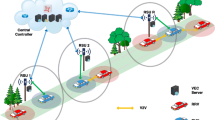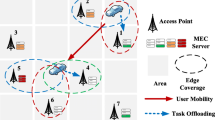Abstract
The recent surge in the number of connected vehicles and vehicular applications really benefits citizens. Various vehicular applications are developed to cater for the increasingly sophisticated demands of drivers. Against this background, vehicular edge computing (VEC) is put forward as a promising solution to meet the strict latency requirement of these vehicular applications, by undertaking the computation offloaded from the nearby vehicles. Furthermore, task-oriented caching strategies are also applied to VEC for performance improvement. However, challenges faced by caching-enabled VEC still need to be addressed. For example, many factors can restrict the application of task caching in VEC, which usually include limited caching capability, extra energy consumption incurred by task caching, caching results delivery and so on. To overcome these issues, we propose a general caching-enabled VEC scheme and aim to jointly optimize the task caching and computation offloading in the VEC system. Moreover, we consider not only the response latency reduction benefitting from task caching, but also the energy consumption incurred by task caching. In particular, we strive to minimize the weighted sum of the service time and energy consumption for all the offloading requests in VEC. Due to the exponential time taken to obtain the optimal value, we in this paper propose a genetic algorithm-based task caching and computation offloading strategy. Extensive simulation has been carried out to investigate its efficiency compared to the benchmark algorithms. The simulation results reveal that the proposed strategy outperforms other approaches including the greedy approach and the random approach.











Similar content being viewed by others
References
Tang C, Zhu C, Wei X, Wu H, Li Q, Rodrigues JJPC (2020) Intelligent resource allocation for utility optimization in rsu-empowered vehicular network. IEEE Access 8:94453–94462
Feng J, Liu Z, Wu C, Ji Y (2019) Mobile edge computing for the internet of vehicles: Offloading framework and job scheduling. IEEE Veh Technol Mag 14(1):28–36
Laroui M, Nour B, Moungla H, Afifi H, Cherif MA (2020) Mobile vehicular edge computing architecture using rideshare taxis as a mobile edge server. In: IEEE 17th Annual Consumer Communications & Networking Conference, CCNC 2020, Las Vegas, NV, USA, January 10-13, 2020, IEEE pp. 1–2
Zhang J, Guo H, Liu J, Zhang Y (2020) Task offloading in vehicular edge computing networks: A load-balancing solution. IEEE Trans Veh Technol 69(2):2092–2104
Xu J, Chen L, Zhou P (2018) Joint service caching and task offloading for mobile edge computing in dense networks. In: 2018 IEEE Conference on Computer Communications, INFOCOM 2018, Honolulu, HI, USA, April 16-19, 2018, IEEE pp. 207–215
Yao Y, Xiao B, Wang W, Yang G, Zhou X, Peng Z (2020) Real-time cache-aided route planning based on mobile edge computing. IEEE Wirel Commun 27(5):155–161
Avino G, Malinverno M, Malandrino F, Casetti C, Chiasserini C (2017) Characterizing docker overhead in mobile edge computing scenarios. In: Proceedings of the Workshop on Hot Topics in Container Networking and Networked Systems, HotConNet@SIGCOMM 2017, Los Angeles, CA, USA, August 25, 2017, ACM pp. 30–35
Cha N, Wu C, Yoshinaga T, Ji Y, Yau KA (2021) Virtual edge: Exploring computation offloading in collaborative vehicular edge computing. IEEE Access 9:37739–37751
Gu X, Zhang G (2021) Energy-efficient computation offloading for vehicular edge computing networks. Comput Commun 166:244–253
Hu J, Chen C, Cai L, Khosravi MR, Pei Q, Wan S (2021) Uav-assisted vehicular edge computing for the 6g internet of vehicles: Architecture, intelligence, and challenges. IEEE Commun Stand Mag 5(2):12–18
Wu C, Liu Z, Liu F, Yoshinaga T, Ji Y, Li J (2020) Collaborative learning of communication routes in edge-enabled multi-access vehicular environment. IEEE Trans Cogn Commun Netw 6(4):1155–1165
Zhao L, Yang K, Tan Z, Li X, Sharma S, Liu Z (2021) A novel cost optimization strategy for sdn-enabled uav-assisted vehicular computation offloading. IEEE Trans Intell Transp Syst 22(6):3664–3674
Sonmez C, Tunca C, Ozgovde A, Ersoy C (2021) Machine learning-based workload orchestrator for vehicular edge computing. IEEE Trans Intell Transp Syst 22(4):2239–2251
Wang S, Ye D, Huang X, Yu R, Wang Y, Zhang Y (2021) Consortium blockchain for secure resource sharing in vehicular edge computing: A contract-based approach. IEEE Trans Netw Sci Eng 8(2):1189–1201
Islam S, Badsha S, Sengupta S, La HM, Khalil I, Atiquzzaman M (2021) Blockchain-enabled intelligent vehicular edge computing. IEEE Netw 35(3):125–131
Hao Y, Chen M, Hu L, Hossain MS, Ghoneim A (2018) Energy efficient task caching and offloading for mobile edge computing. IEEE Access 6:11365–11373
Xing H, Cui J, Deng Y, Nallanathan A (2019) Energy-efficient proactive caching for fog computing with correlated task arrivals. In: 20th IEEE International Workshop on Signal Processing Advances in Wireless Communications, SPAWC 2019, Cannes, France, July 2-5, 2019, IEEE pp. 1–5
Javed MA, Zeadally S (2021) Ai-empowered content caching in vehicular edge computing: Opportunities and challenges. IEEE Netw 35(3):109–115
Qiao G, Leng S, Maharjan S, Zhang Y, Ansari N (2020) Deep reinforcement learning for cooperative content caching in vehicular edge computing and networks. IEEE Internet Things J 7(1):247–257
Tan LT, Hu RQ, Hanzo L (2019) Twin-timescale artificial intelligence aided mobility-aware edge caching and computing in vehicular networks. IEEE Trans Veh Technol 68(4):3086–3099
Wang S, Zhang Z, Yu R, Zhang Y (2017) Low-latency caching with auction game in vehicular edge computing. In: 2017 IEEE/CIC International Conference on Communications in China, ICCC 2017, Qingdao, China, October 22-24, 2017, IEEE pp. 1–6
Tang C, Zhu C, Wei X, Wu H, Rodrigues JJPC (2021a) Task offloading and caching for mobile edge computing. In: 2021 IEEE 17th Int. Wireless Communications & Mobile Computing Conference-, IWCMC, Harbin, China, June 28 - July 2, 2021, IEEE pp. 1–5
Tang C, Xia S, Li Q, Chen W, Fang W (2021b) Resource pooling in vehicular fog computing. J Cloud Comput 10(1):19
Acknowledgements
This work is supported by the National Natural Science Foundation of China (61801325 and 62071327). The authors are really grateful to the editor and anonymous reviewers for their professional comments and helpful suggestions.
Author information
Authors and Affiliations
Corresponding author
Ethics declarations
Conflict of interest
The authors declare that they have no conflict of interest.
Additional information
Publisher’s Note
Springer Nature remains neutral with regard to jurisdictional claims in published maps and institutional affiliations.
Rights and permissions
About this article
Cite this article
Tang, C., Wu, H. Joint optimization of task caching and computation offloading in vehicular edge computing. Peer-to-Peer Netw. Appl. 15, 854–869 (2022). https://doi.org/10.1007/s12083-021-01252-w
Received:
Accepted:
Published:
Issue Date:
DOI: https://doi.org/10.1007/s12083-021-01252-w




